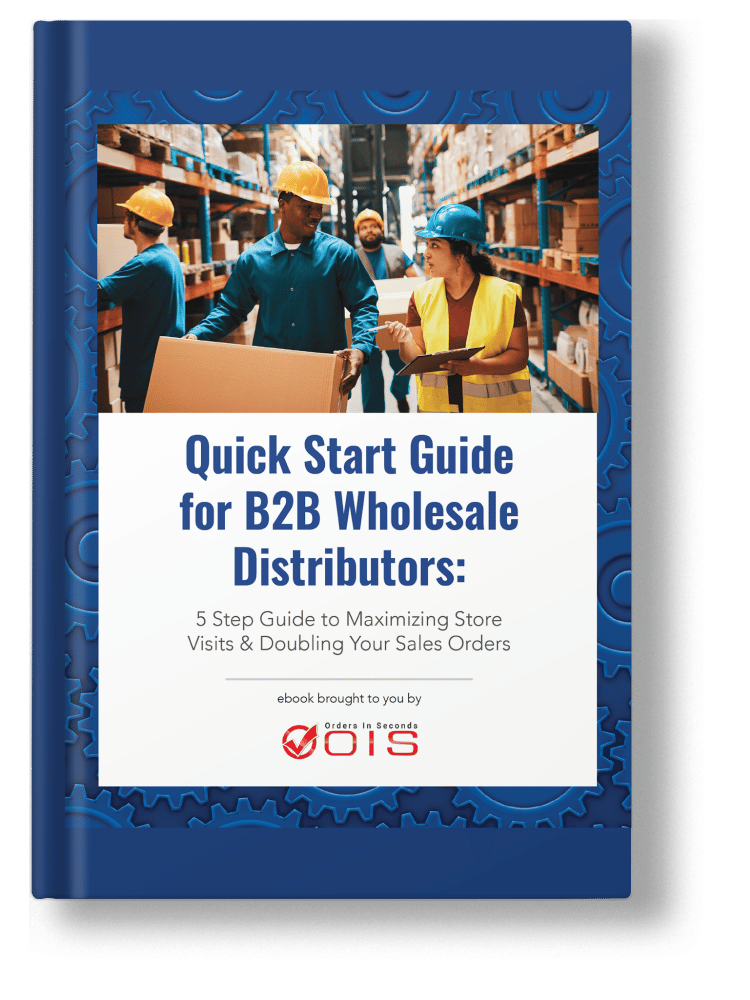What is a wholesale distribution channel? Simply put, it’s a streamlined pathway that connects manufacturers to the retail world, enabling the bulk transfer of goods through key intermediaries. This article unpacks the nuts and bolts of wholesale distribution, shedding light on the roles wholesalers play, the economic impact of these channels, and the evolving shape of goods distribution in the modern economy.
Key Takeaways
- Wholesale distribution channels are crucial networks that facilitate the flow of goods from manufacturers to retailers, comprising over 400,000 establishments and accounting for approximately $9 trillion in the U.S. economy.
- The wholesale distribution system involves key players such as manufacturers, wholesalers, distributors, and retailers, each playing a specific role in the supply chain, offering cost savings, product variety, and supply chain stability.
- Challenges faced by the wholesale distribution industry include competition from online retailers and manufacturers selling directly to consumers, requiring strategies like embracing technology, building strong relationships, and diversifying product offerings to remain competitive.
Table of Contents
- Understanding Wholesale Distribution Channels
- Key Players in Wholesale Distribution
- Benefits of Utilizing Wholesale Distribution Channels
- Challenges Faced by Wholesale Distributors
- Strategies for Success in Wholesale Distribution
- Summary
- Frequently Asked Questions
- Elevate Your Wholesale Distribution Business with Orders in Seconds
Understanding Wholesale Distribution Channels

Akin to the nervous system of the body, the wholesale distribution channels form a complex network, facilitating the distribution process and the flow of goods from point A to point B. At its core, wholesale distribution involves:
- Selling products in bulk to retailers and other professional business users
- An intricate dance between manufacturers, wholesalers, and retailers
- Culminating in products reaching the hands of consumers.
Wholesale distributors, including larger wholesale distributors, are the pivotal players in this dance. As a wholesale distributor, they purchase goods in large quantities from manufacturers at discounted prices and distribute them to various retailers or resellers. Serving as intermediaries, they simplify the process for both ends of the supply chain. Picture them as the maestros of the orchestra, coordinating the various sections to create a harmonious symphony of supply and demand.
In the United States alone, the wholesale distribution landscape is vast, comprising over 400,000 establishments generating approximately $9 trillion in sales. This economic powerhouse, known as the wholesale distribution business, improves efficiency, provides access to an extensive assortment of products, and fuels the growth of the retail sector. As wholesale distribution businesses continue to thrive, they play a crucial role in supporting the economy.
The Importance of Distribution Channels
Distribution channels are like the arteries and veins in our bodies, delivering life-sustaining blood to every cell. Similarly, the distribution channel ensures that products are available in the market to meet customer demands. Wholesale distributors act as the heart of this system, pumping a diverse range of products to retailers.
They consolidate products, streamline the purchasing process for retailers, and ultimately ensure that the right product reaches the right place at the right time.
Types of Wholesale Distribution Channels
Just as a tree branches out, the wholesale distribution channels diversify to cater to different market needs. These channels include:
- Retail
- Direct mail
- Telemarketing
- E-commerce
- Other wholesalers
They serve as the bridges connecting manufacturers to retailers, both in the brick-and-mortar world and the digital realm, enabling them to expand their product selection from a diverse range of manufacturers.
Wholesale importers or distributors specialize in forming connections between businesses and manufacturers or suppliers for unique or specialized products. On the other hand, general line distributors deal with a broad spectrum of products across various industries, including:
- Home decor
- Apparel
- Toys
- Beauty products
The diversity and flexibility offered by these channels ensure that retailers can cater to the ever-changing consumer preferences and market trends.
Key Players in Wholesale Distribution
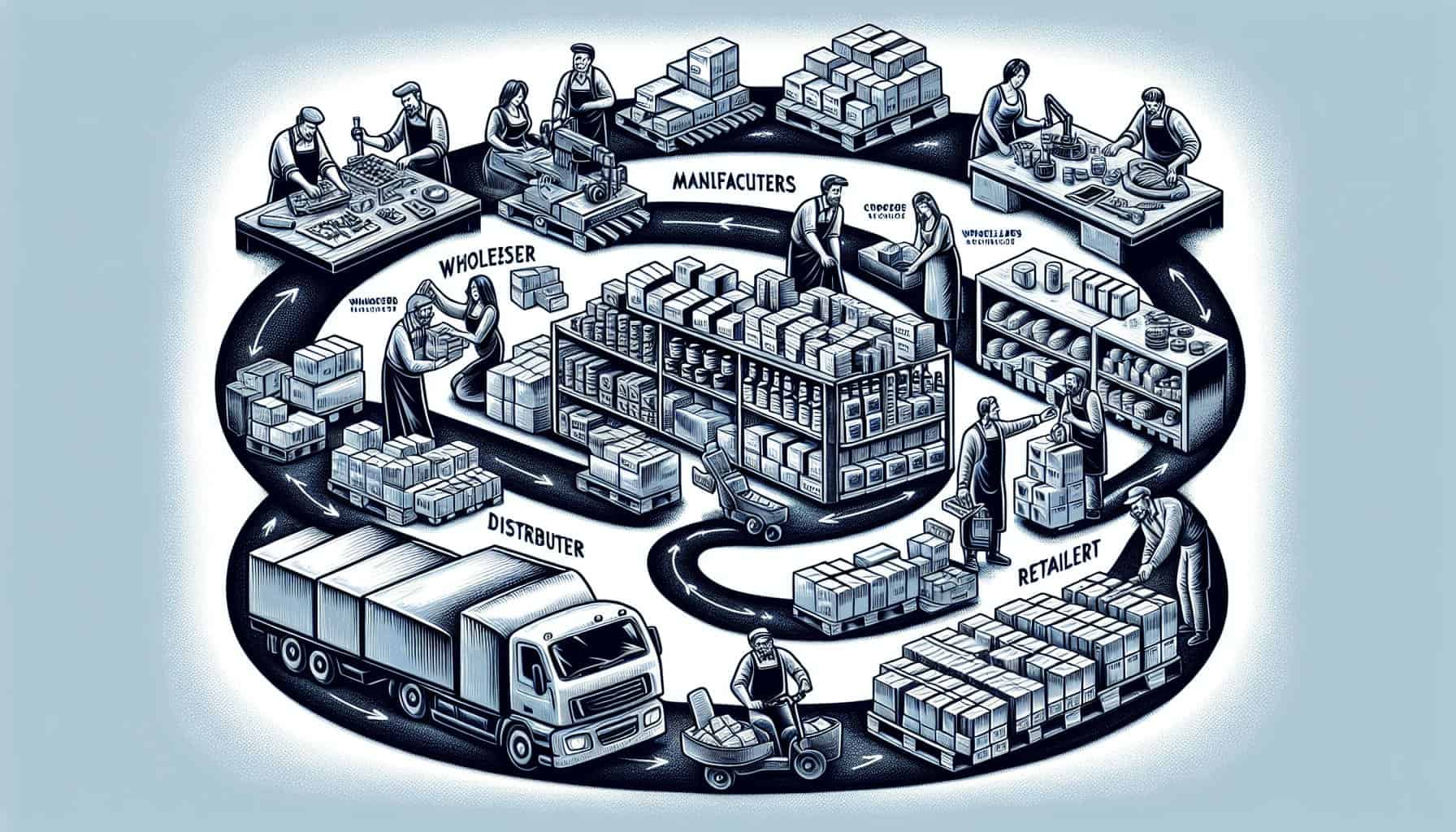
The world of wholesale distribution is a stage where various key players perform their roles meticulously to ensure the smooth flow of goods. These players include:
- Manufacturers
- Wholesalers
- Distributors
- Retailers
Each player has a unique role, and their coordinated efforts result in successful product delivery to the end customer.
The supply chain process typically involves the following steps:
Manufacturers produce goods that are then supplied to wholesale distributors.
Wholesalers buy these products in bulk and resell them, primarily to retailers.
Distributors work with various intermediaries, including wholesalers, to ensure the products reach retailers.
Retailers serve as the last link in this chain, bringing products from the back rooms of the supply chain to the customer’s shopping bag.
Manufacturers
Manufacturers are the heartbeat of the supply chain. They take raw materials and transform them into the products that fill our shopping carts. They supply these goods to wholesale distributors, forgoing direct sales to consumers as they rely on the networks of distributors or wholesalers.
This partnership with wholesalers in the food and beverage industry not only ensures the wide distribution of their products but also allows manufacturers to focus on what they do best – creating high-quality products.
Wholesalers
In the intricate tapestry of the supply chain, wholesalers serve as the crucial threads that connect manufacturers and retailers. They buy products in bulk, often availing discounts due to the high volume of their purchases. Unlike manufacturers that specialize in producing specific goods, wholesalers often procure their goods from an assortment of manufacturers and distributors.
This approach allows them to offer a diverse product selection to retailers, effectively becoming a one-stop-shop for various product needs.
Distributors
Distributors, operating from their distribution center, are the unsung heroes of the supply chain. They handle the storage, inventory management, and shipping of goods, enabling manufacturers to reach a larger market. By distributing products to retailers, they expand the manufacturer’s customer base into new or challenging areas, eliminating the need for an extensive sales infrastructure.
Their role extends beyond mere distribution; they manage vendor relationships, utilize diverse sales channels, and form strategic partnerships to actively market and sell manufacturers’ products.
Retailers
Retailers, often known as retail stores, represent the final lap in the relay race of wholesale distribution, serving as the last step in bringing products to end customers. They are the face of the supply chain, the point of interaction with the ultimate consumers. To compete with online outlets, retailers are creating personalized shopping experiences and capitalizing on attentive customer service.
They receive the baton passed on by manufacturers, wholesalers, and distributors and take it across the finish line to the customer.
Benefits of Utilizing Wholesale Distribution Channels
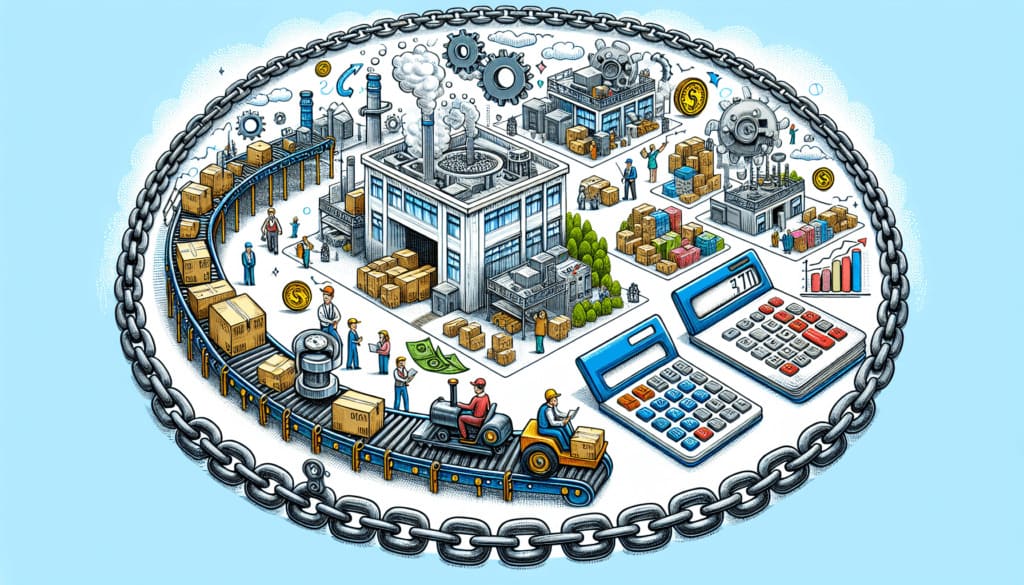
The wholesale distribution channels offer a plethora of benefits to manufacturers, retailers, and the supply chain, much like the sunlight that enables the growth of a plant. E-commerce companies, in particular, can sell a more extensive range of goods thanks to wholesalers who source a variety of products.
These benefits extend beyond just the variety and availability of products. They result in cost savings, offer a diverse range of products, and ensure supply chain stability. Let’s delve deeper into these benefits, each a facet that contributes to the shining gem that is wholesale distribution.
Cost Savings
One of the significant benefits of wholesale distribution is the cost savings it offers. Wholesale distributors, through their bulk purchasing, often receive discounts, allowing them to sell to retailers at lower prices than if retailers bought directly from manufacturers. Additionally, by aggregating purchases, wholesale distributors can negotiate better prices from manufacturers, resulting in savings that trickle down to retailers.
This cascading effect of cost savings also leads to reduced operating costs for both manufacturers and retailers, further solidifying the economic advantage of wholesale distribution.
Product Variety
In a world where consumer preferences are as diverse as the colors of a rainbow, product variety is a critical factor for retailers. Wholesale distributors, with their broad selection of products, act as a treasure trove for retailers. By leveraging the vast catalogs of wholesale distributors, retailers can expand their product offerings across multiple categories and from different manufacturers.
This diversity allows retailers to cater to a wide range of customer needs and preferences without requiring substantial initial investment.
Supply Chain Stability
Just as a ship’s anchor ensures its stability in stormy waters, wholesale distributors secure supply chain stability. They:
- Reduce the risk of product shortages for retailers, ensuring a steady flow of goods
- Leverage advanced inventory management techniques, including real-time tracking with RFID and IoT
- Use AI-driven demand forecasting to improve inventory optimization
By linking manufacturers with the market, taking on inventory responsibilities, and implementing effective marketing strategies, distributors facilitate the smooth flow of goods in the supply chain.
Challenges Faced by Wholesale Distributors
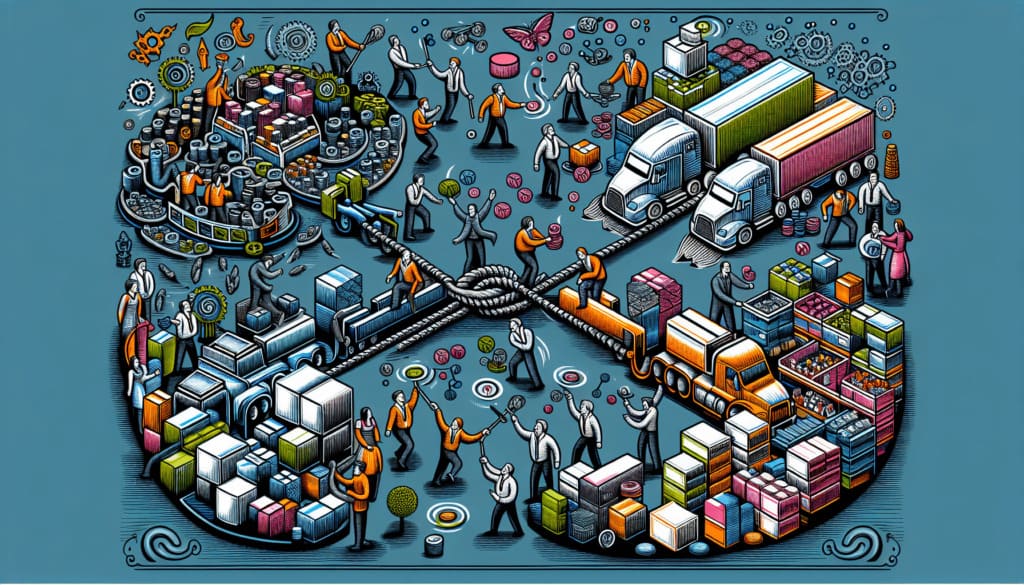
While wholesale distribution channels offer significant advantages, they also face a set of challenges. The landscape is evolving, with intensified competition from online retailers and manufacturers selling direct-to-consumer, leading to significant market shifts. Some of the challenges faced by wholesale distribution channels include:
- Intensified competition from online retailers and manufacturers selling direct-to-consumer
- Significant market shifts
- Cost management, requiring effective strategies to control expenses
These challenges, however, are not insurmountable. They represent opportunities for growth, innovation, and adaptation in the face of change.
Additionally, amidst these obstacles, it’s vital to avoid common errors. Learn how to steer clear of the top pitfalls in wholesale distribution by downloading our free eBook “Avoid the Top 5 Mistakes Wholesale Distribution Make”, ensuring your business stays resilient and successful in today’s dynamic landscape.

Avoid the Top 5 Mistakes Wholesale Distributors Make
Competition
The rise of digital platforms has led to the intensification of competition in the wholesale distribution industry. Online retail outlets offer consumers the advantage of direct purchasing, posing a firm challenge to traditional wholesale distributors. Moreover, the emerging trend in wholesale distribution is making the storage and delivery functions obsolete.
However, many wholesale distributors are countering this tide by shifting towards omnichannel selling across mobile, web, and physical stores.
Direct Manufacturer Sales
Another challenge for wholesale distributors stems from manufacturers selling directly to consumers. This trend is growing, with manufacturers leveraging online platforms or their own physical stores to engage in direct sales. Such actions create competitive stress for wholesalers, who typically rely on these products for their sales.
This shift compels wholesalers to reassess their role in the distribution chain and find innovative ways to add value.
Evolving Customer Demands
The winds of customer demands are everchanging, posing yet another challenge to wholesale distributors. To ride these winds, distributors use data analytics to track and analyze customer behavior. This analysis provides valuable insights into demand patterns and customer preferences, enabling wholesalers to adapt effectively.
The use of data analytics and informed decision-making allows distributors to navigate the impact of changing customer expectations on the wholesale distribution industry.
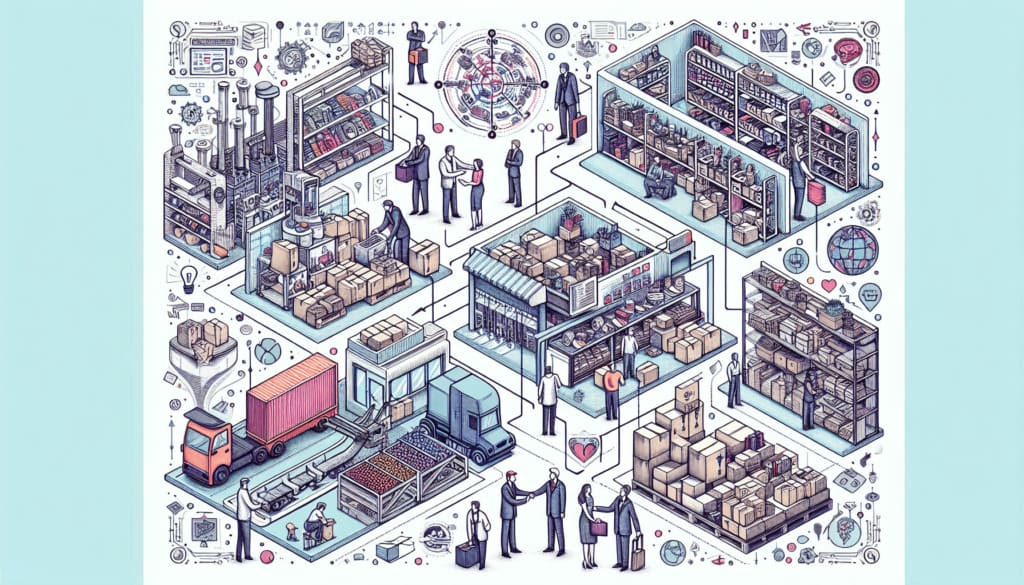
While challenges abound in the wholesale distribution industry, they are not without solutions. Various strategies have emerged that can help wholesale distributors navigate the evolving landscape of the industry. These strategies include:
- Embracing technology
- Building strong relationships
- Diversifying product offerings
- Providing value-added services
By adjusting their methods and adapting to changes, wholesale distributors can stay relevant and succeed in the face of challenges. Let’s delve into these strategies and explore how they can help wholesale distributors thrive in this dynamic market.
Embracing Technology
In today’s digital age, technology is not just an option; it’s a necessity. Embracing and integrating technology is critical for wholesale distributors to manage business growth and streamline operations effectively. Digital technologies, such as enhanced e-commerce platforms, enable distributors to reach a broader customer base and provide flexible, efficient ordering and fulfillment options.
Data analysis and business intelligence tools help understand customer purchasing patterns, enabling tailored B2B experiences and informed decisions. Moreover, technologies such as AI and IoT contribute to the optimization of the supply chain, resulting in improved efficiency and responsiveness.
To learn more about leveraging technology and other tools for wholesale distribution success, download our eBook “Double Your Sales Orders in 5 Steps” today.

Double Your Sales Orders in 5 Steps
This exclusive eBook is packed with real-world, data-driven concepts that can help maximize your store visits and double your sales. Get it for FREE – Today!
Building Strong Relationships
Building and maintaining strong relationships with suppliers and other business partners is critical for securing better pricing, quality, and reliability in wholesale distribution. These relationships, rooted in trust, enhanced communication, and mutual respect, lead to better problem-solving, shared goals, and the capacity to align goals and overcome challenges together.
Collaborative relationships foster innovation and enable effective management of challenges in wholesale distribution. Hence, wholesale distributors must:
- Cultivate flexibility
- Maintain regular check-ins
- Adapt to new conditions
- Maintain strong business relationships
Diversifying Product Offerings
Diversifying product offerings is another key strategy for success in the wholesale distribution industry. With their broad selection of products, wholesale distributors enable retailers to test and add new product lines and categories. This capability helps retailers to cater to a diverse range of customer needs and preferences without requiring substantial initial investment.
Also, to remain competitive against Direct-to-Consumer models, wholesale distributors are enhancing their focus on smarter inventory management protocols, including the integration of sophisticated inventory management software.
Providing Value-Added Services
To stay ahead in the competitive landscape, wholesale distributors need to go beyond the basics. Providing value-added services can increase their competitive edge. The services provided encompass inventory management, vendor and sales support, and warehouse and transportation logistics. These services cover a range of essential business operations. By offering tailored solutions using their industry expertise coupled with data-driven insights, wholesale distributors can add significant value to their offerings.
Moreover, wholesalers can reinforce the supply chain by offering drop-shipping services, allowing retailers to pass on customer orders directly to the wholesaler for fulfillment. This approach contributes to efficient supply chain management.
Summary
The world of wholesale distribution is a vast and complex network that plays a pivotal role in connecting manufacturers to retailers and ultimately to consumers. It serves as the invisible backbone of the economy, ensuring the seamless flow of goods across the supply chain. The roles of manufacturers, wholesalers, distributors, and retailers are each crucial in this process, contributing collectively to the efficient functioning of this system. The benefits offered by wholesale distribution channels, including cost savings, product variety, and supply chain stability, significantly contribute to the smooth functioning of the retail sector.
However, this industry also faces challenges, including competition, direct manufacturer sales, and evolving customer demands. But these challenges also present opportunities for growth, innovation, and adaptation. By embracing technology, building strong relationships, diversifying product offerings, and providing value-added services, wholesale distributors can navigate these challenges and succeed in the dynamic market. As we look to the future, the role of wholesale distribution remains more crucial than ever, promising continued growth and innovation in this vital sector of our economy.
Frequently Asked Questions
An example of a wholesaler in a distribution channel is a Christmas tree wholesaler who buys from growers and sells to retail outlets. Restaurant food suppliers also serve as wholesalers in the exclusive distribution channel.
Wholesalers serve as intermediaries, helping manufacturers expand their reach to a larger consumer base and various locations. They handle the movement of goods from producers to their warehouses and then on to retailers, offering delivery services to reach a wider market and retain major customers.
What is the role of wholesale distribution in the supply chain?
Wholesale distribution is essential in the supply chain as it acts as an intermediary between manufacturers and retailers, handling bulk purchases from manufacturers and facilitating the flow of goods to retailers.
Wholesale distribution channels offer cost savings, product variety, and supply chain stability, improving efficiency and fueling the growth of the retail sector.
Wholesale distributors face challenges such as competition from online retailers and direct manufacturer sales, as well as evolving customer demands. These challenges also bring opportunities for growth and innovation.
Elevate Your Wholesale Distribution Business with Orders in Seconds
Refine your wholesale distribution operations with Orders in Seconds. Our solutions, including the OIS Pro App and OIS eCommerce App, are tailored to enhance key facets of the distribution channel.
The OIS Pro App simplifies order taking for DSD and Pre-Sales reps with integrated payment acceptance, barcode scanning, and user-friendly navigation. Meanwhile, the OIS Ecommerce App transforms the B2B buying experience with easy order placement, even offline. These tools address critical challenges in wholesale distribution, boosting efficiency and driving growth.
To explore how OIS solutions can optimize your wholesale distribution processes, schedule a demo today.
Distribution Channel Enhancement:
Distribution channel enhancement refers to strategies and actions taken to improve the efficiency and effectiveness of a company’s distribution network. This can include:
- Optimizing Logistics: Streamlining transportation, warehousing, and delivery processes.
- Expanding Channel Reach: Adding new distribution partners or exploring alternative channels (e.g., e-commerce).
- Improving Channel Relationships: Strengthening partnerships with distributors and retailers.
- Leveraging Technology: Implementing systems for inventory management, order processing, and tracking.
- Enhancing Customer Service: Providing better support and communication throughout the distribution process.
- Data Analysis: Using data to find bottlenecks and opportunities for improvement.
Importance of Networking in Wholesaling:
Networking is vital in wholesaling for several reasons:
- Building Relationships: Establishing connections with suppliers, retailers, and other industry professionals.
- Finding New Opportunities: Discovering new products, markets, and potential partners.
- Gaining Market Insights: Staying informed about industry trends and competitor activities.
- Negotiating Deals: Leveraging relationships to secure favorable pricing and terms.
- Building Trust: Establishing credibility and reputation within the industry.
- Problem Solving: Having industry contacts to help solve problems.
Operational Challenges Faced by Distribution Channels:
Distribution channels face various operational challenges, including:
- Inventory Management: Balancing supply and demand, managing stockouts and overstocking.
- Logistics and Transportation: Optimizing delivery routes, managing transportation costs, and ensuring timely delivery.
- Order Fulfillment: Processing orders accurately and efficiently.
- Demand Forecasting: Accurately predicting customer demand.
- Technology Implementation: Integrating and managing technology systems.
- Managing Returns: Handling product returns and reverse logistics.
- Customer Service: Providing excellent customer service and resolving issues.
- Maintaining Quality: Ensuring product quality and safety throughout the distribution process.
- Cost Control: Minimizing operational costs.
Manage Inventory:
Managing inventory involves a range of activities aimed at optimizing inventory levels and minimizing costs. This includes:
- Forecasting Demand: Predicting future sales to ensure adequate stock levels.
- Ordering and Receiving Goods: Efficiently placing orders with suppliers and receiving goods.
- Storing and Handling Inventory: Properly storing and handling inventory to prevent damage and spoilage.
- Tracking Inventory Levels: Maintaining accurate records of inventory levels using inventory management systems.
- Analyzing Inventory Performance: Regularly analyzing inventory data to identify areas for improvement.
Wholesale and Retail Lies:
This phrase implies deceptive practices that can occur within wholesale and retail transactions. These can include:
- Misrepresenting Product Quality: Providing false information about product features or quality.
- False Advertising: Making misleading claims in marketing materials.
- Price Manipulation: Engaging in unfair pricing practices.
- Inventory Fraud: Falsifying inventory records.
- Counterfeit Products: Selling fake or imitation products.
Wholesale Distribution Companies:
These companies act as intermediaries between manufacturers and retailers or other businesses. They purchase products in bulk from manufacturers and then resell them to their customers. They provide various services, including:
- Warehousing and Storage: Storing products in warehouses.
- Logistics and Transportation: Delivering products to customers.
- Sales and Marketing Support: Providing marketing materials and sales support.
- Inventory Management: Managing inventory levels.
- Customer Service: Providing customer support.




